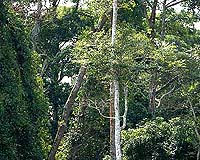| . |  |
. |
Lebel-Sur-Quevillon, Canada (AFP) June 29, 2009 "Some say that I'm practicing voodoo in the woods, but I'm just very efficient. They call me the 'General of the forest,'" said Mamadou N'diaye with a burst of laughter. Since 2002, this Malian immigrant has spent his summers working in the boreal forests of northeastern Canada, far from his two little girls and family who live in Montreal about 800 kilometers (500 miles) to the south. Armed with a gas-powered swatter, he clears the undergrowth that stunts the growth of spruce trees due to be harvested in 20 years or so. His nickname stuck after he amazed co-workers with his prowess. From May to the first snows in October, this strapping lad born in Bamako dances around the woods swatting shrubs for up to 10 hours a day, his clothes often soaked from heavy rains, his skin pocked-marked by tenacious, biting black flies. His only link to colleagues spread out across this vast and harsh landscape is a whistle clipped to his jacket: three short bursts to call for help; four to signal a retreat in case of forest fire or bear attack. "It's a difficult life. We're far from our families. We're not paid an hourly wage, rather by hectares of forest cleared. You understand, it's like being in the army," he said. "But it pays well." "I make a minimum of 300 Canadian dollars (260 US) per day, and when the terrain is good, up to 500, 600 dollars (430, 520 US)," the high school drop-out said with a grin. By the end of the work season, Mamadou N'diaye will have pocketed nearly 40,000 dollars (34,600 US), allowing him to take off the rest of the year to spend with his family, vacationing or tinkering at home. "We can't make that kind of money in Montreal," Canada's second-largest city, commented Petru Rasunoiu, 38, a Romanian who landed in Canada in 1992 after the collapse of communism in his homeland. In winter, he works in the Montreal's building trade. His work partner and compatriot Constantin Hliban drives a taxi when he is not working deep in the Canadian wilds and hopes to some day use the money he makes here to buy his own taxi license, rather than continue leasing it from a taxi company. "But it costs 200,000 to 300,000 dollars," said the 25-year-old. Weary of minimum-wage jobs at nine or 10 dollars an hour (7.80-8.70 US), more and more immigrants are seeking to make their fortunes in Canada's remote forests. Russians, Ukrainians, Romanians, Senegalese, Malian and even a few Frenchmen can be found doing this exhausting work shunned by Canadians no longer willing to spend months away from their families at a time and toil long hours over back-breaking work. "These are people who want to earn a lot of money in very little time, who have big ambitions, who are even willing to work at this in frigid winters," explained Eric Chamberland, silvicultural coordinator for La Foret de demain (The Forest of Tomorrow). "It's not an easy job, so it's not for everyone," said the veteran 25-year logger. "That iconic image of a lumberjack going into the forest with his axe over his shoulder no longer exists. It's from a bygone era." In addition to the brush clearers, Chamberland also manages tree planters who come in after a forest has been chopped down. Some 8,000 square kilometers (3,100 square miles) of boreal forest are clear-cut each year in Canada -- about the size of a small country -- and forestry firms are required by law to re-forest these Crown lands. Workers' salaries are determined by the volume of trees they plant. Like ants on a devastated hill, they scatter across the open outback plugging tiny saplings into the ground in a bid to revive the forest. All day long, immigrants and students hoping to pay for next year's tuition trudge bent double through muddy furrows, planting an average of 2,000 saplings per day. The best plant up to 4,500. Frenchman Steve Petitpas is here for his second season of tree-planting. "I unplug my brain, I leave it at the hotel. I count my steps. One, two, 'poof,' one, two, 'poof,'" he said, plugging two more saplings into the ground, a cigarette hanging precariously from his lips. "You don't go crazy, but you do end up talking to yourself sometimes," he said. "You can easily review your entire life in your head up to five times per day." Share This Article With Planet Earth
Related Links Forestry News - Global and Local News, Science and Application
 Uganda forests rapidly disappearing: study
Uganda forests rapidly disappearing: studyKampala (AFP) June 19, 2009 Uganda has lost nearly a third of its forest cover since 1990 due to expanding farmlands, a rapidly growing human population and increased urbanisation, a government report said on Friday. In 1990, the east African nation had more than five million hectares of forest cover but by 2005 only 3.5 million hectares (8.6 million acres) remained, the report, published by Ugandan's National ... read more |
|
| The content herein, unless otherwise known to be public domain, are Copyright 1995-2009 - SpaceDaily. AFP and UPI Wire Stories are copyright Agence France-Presse and United Press International. ESA Portal Reports are copyright European Space Agency. All NASA sourced material is public domain. Additional copyrights may apply in whole or part to other bona fide parties. Advertising does not imply endorsement,agreement or approval of any opinions, statements or information provided by SpaceDaily on any Web page published or hosted by SpaceDaily. Privacy Statement |